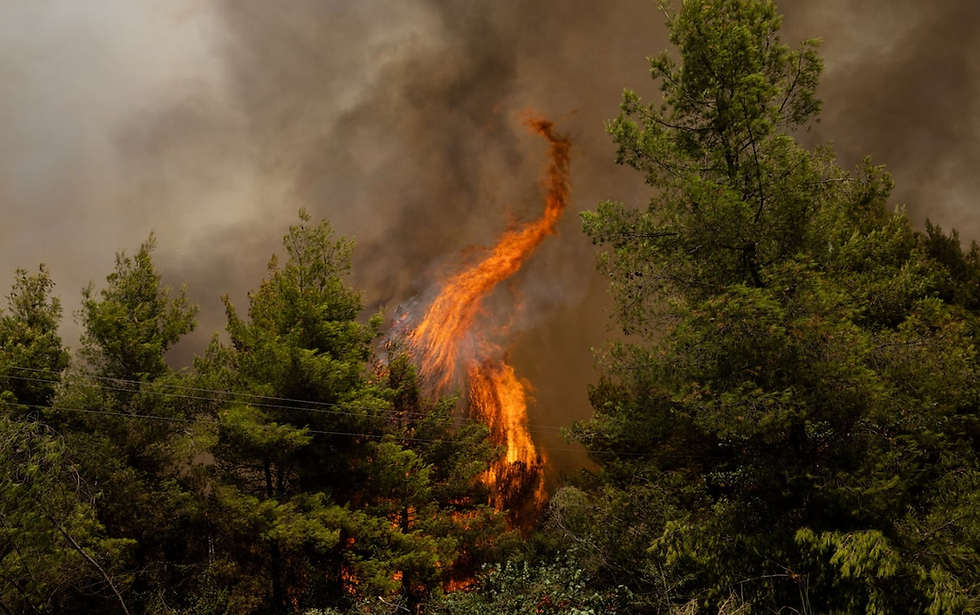Weather Extremes in Italy: A Personal Testimony from Lombardy
- Valentina Zonca

- Aug 7, 2023
- 4 min read
Eco-anxiety.
Eco-anxiety has been defined as “an extreme worry about the current and future harm to the environment caused by human activity and climate change” (source: Oxford Languages). However, this term refers actually to much more, and researchers are increasingly trying to understand both the emotions that we are all experiencing in response to ecological crises like climate change, and the ways in which these emotions might be valuable for our psychical, psychological, and moral wellbeing.
I am Valentina, a post-doctoral researcher at the Department of Pharmacology and Biomolecular Science at the University of Milan, in Italy. I live in Bergamo, a town 45 minutes away from Milan, and this is not the first time I am writing about something I personally witnessed here, as I previously shared my experiences of living in the city most hit by the COVID-19 pandemic in Italy. It also isn't the first time that Inspire the Mind covers climate-related topics, such as Eco-anxiety is escalating with relentless climate change, How is Climate Change Affecting our Mental Health?, or even, On Love & Loss of Our Flora & Fauna.
Living and working in the north of Italy, I have experienced a rollercoaster or weather conditions.
Unfortunately, Italy is no stranger to weather extremes. Various corners of Italy witnessed several weather catastrophes. One of the latest occurred in May, in the northern Italian region of Emilia-Romagna, where immense floods submerged entire villages and cities, killed 15 people, and left thousands homeless and desperate, losing everything.
My testimony regards another Italian northern region, Lombardy, where sadly the past three weeks will be remembered for a very long time. Indeed, the whole region experienced sweltering heat, but amidst the scorching temperatures, an unexpected twist occurred as a severe storm and tornado swept through the region, damaging many cities, and leaving people putting the pieces of their homes, cars, and industries back together.
The Italian summer is often characterized by long stretches of hot weather and clear skies. However, the intensity of the heat experienced over the past weeks has been particularly noteworthy. The temperature in Milan has been no lower than 30 degrees Celsius for many days in a row, and during the evening and night, there was no rest. Cities were empty apart from a few tourists, who were brave enough to face the hot trying to enjoy what our beautiful cities have to offer, despite the weather. Pavements and roads became scorching, causing discomfort and health hazards to pedestrians and motorists alike.
I personally suffer from this hot weather in the laboratory, where our air conditioning stopped working during the worst days.
On the other hand, friends of mine escaped from the cities for short holidays at the seaside, but they were not as blessed as they were expecting, as the temperature was not dropping anytime soon. For example, in the southern regions of Italy, such as Sicily and Calabria, temperatures reached record highs, exceeding 40 degrees Celsius. As of the current date, Sicily is facing devastating wildfires, posing a significant threat to the island's natural beauty, and prompting urgent efforts to contain the blazes and protect local communities.
But then something changed and just like in movies, we have been thrown into a new scenario, that made everything even worse. Just when Lombardy thought it had experienced enough of the relentless heat, a catastrophic weather event struck the northern regions of Milan and Lombardy. On the evening of July 21st, the first unexpected tornado tore through Milan suburbs leaving a trail of destruction in its wake. But this wasn’t the end, because, on July 24th, a massive storm hit Milan itself, creating an apocalyptic scene. The storm's high winds uprooted trees, damaged buildings, and caused widespread power outages. Homes and businesses suffered significant structural damage, leaving many residents displaced and struggling to cope with the aftermath.

The night of this last storm, I remember being woken up at 4 a.m. I was looking through the window, and I was scared. The sky was floodlit with lightning. And I clearly remember the aftermath, as I was riding my bike to work, I witnessed uprooted trees every ten meters, cars destroyed, and debris all over the streets. Public transport (busses and trams) were shut down, and railways suffered from severe delays.

Unfortunately, my family was directly affected by this storm, and are still suffering the consequences. The entire basement of my family home was flooded. I received a call from my sister, it was 11 pm, and all she said was, “There is water everywhere”. I couldn’t reach them because the storm was massive and would have been impossible to drive, with a hailstorm and tornado approaching shortly. A couple of hours later, they called me reassuring me that they were fine, but that there were firemen in almost every house in the neighbourhood.

I started this personal piece talking about eco-anxiety, and I can say that it is real. This was my first time witnessing such a fast and catastrophic twist of climate events, and it makes me wonder (and feel anxious) about climate change.
I really wish that this resonated with more people and that as many people as possible were thinking about this at the moment. In these uncertain times of climate change, it's essential to maintain hope, by embracing sustainable practices, fostering innovation, and uniting as a global community, so that we can collectively live in a more certain future.










